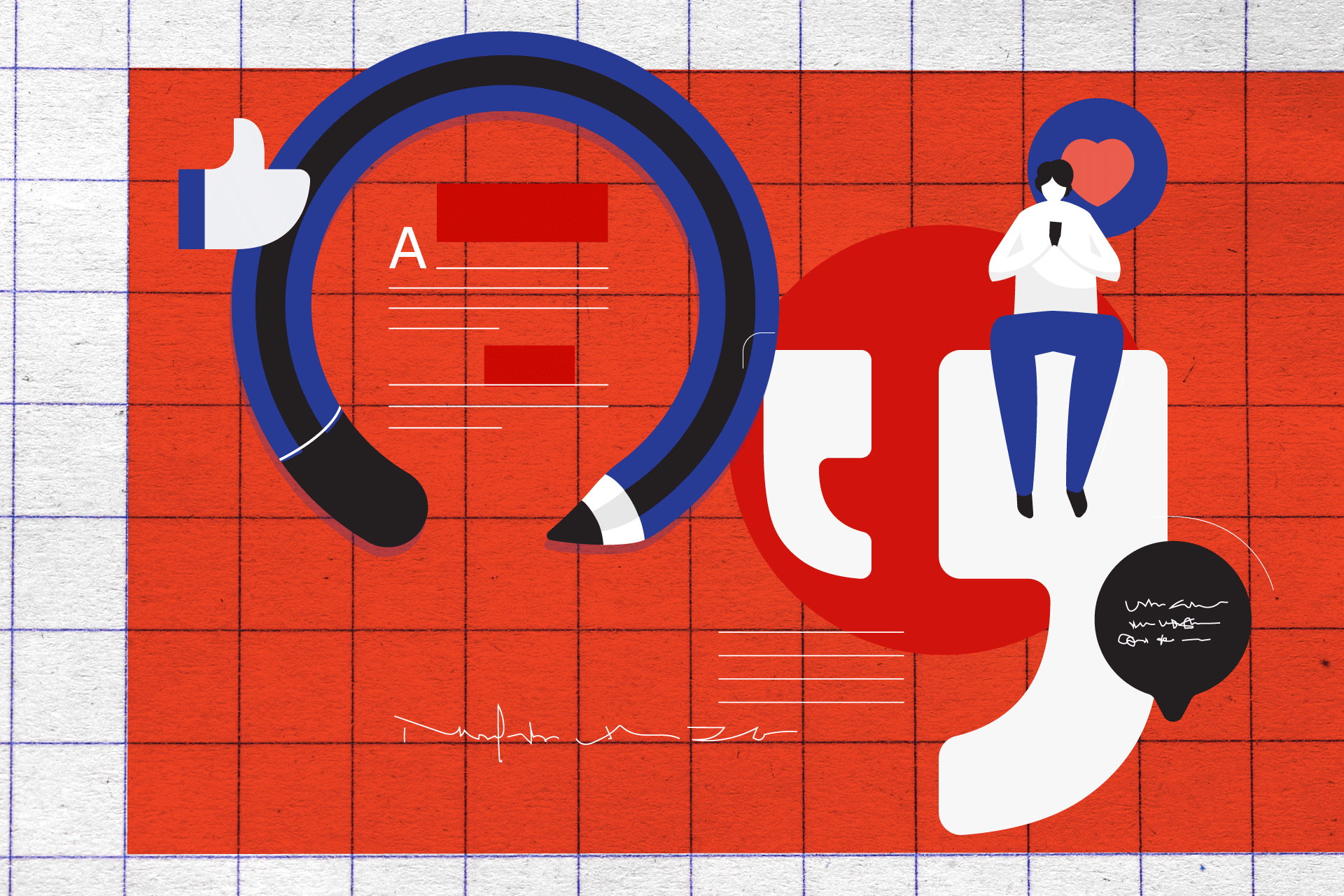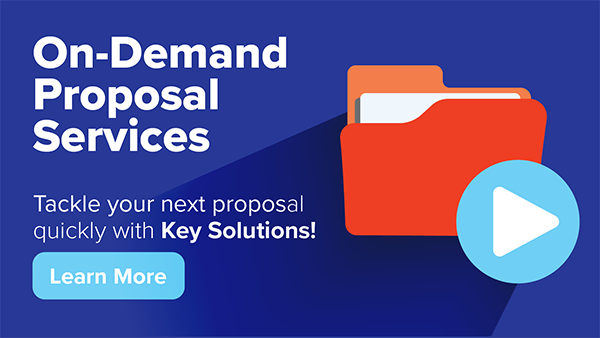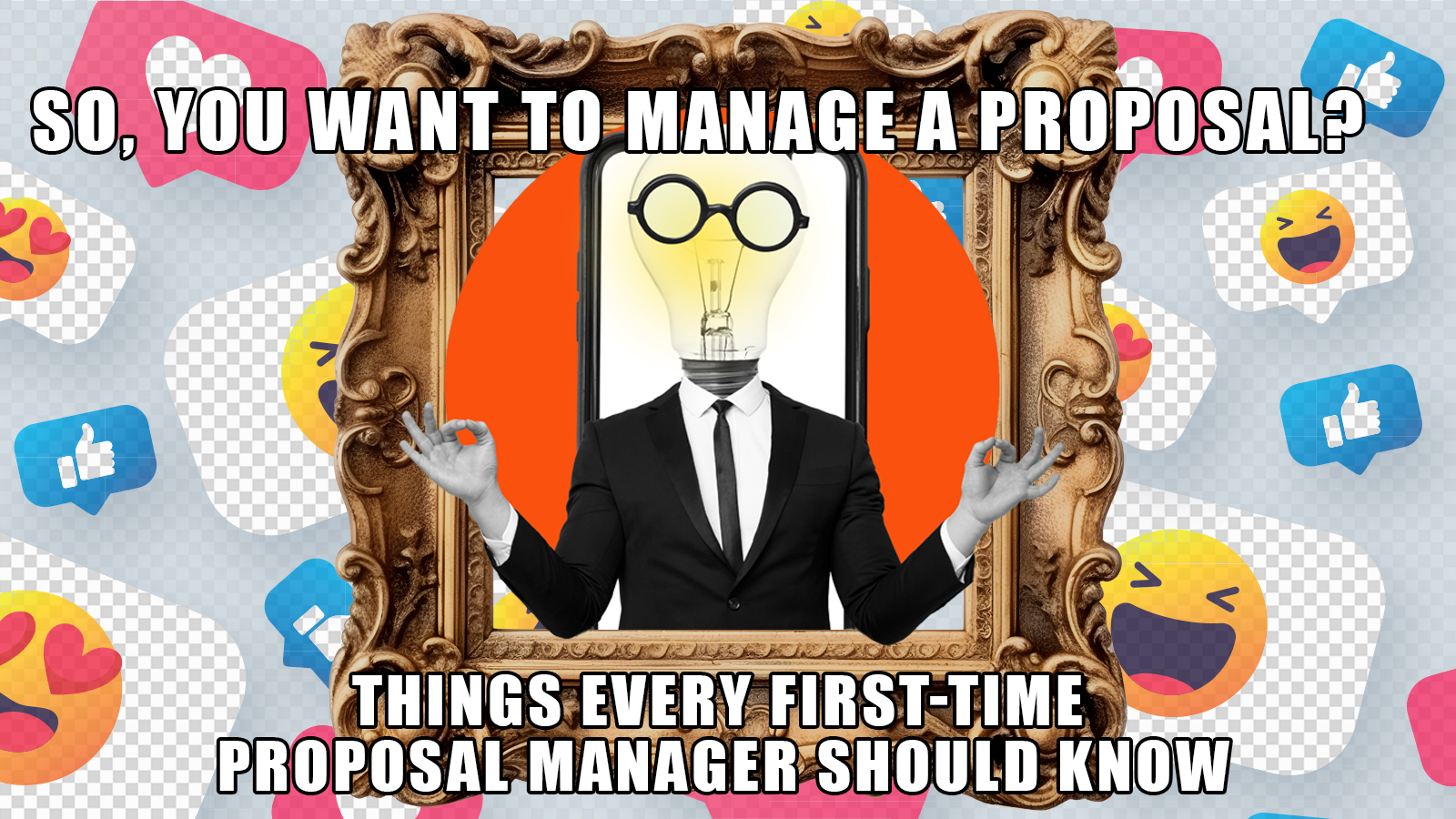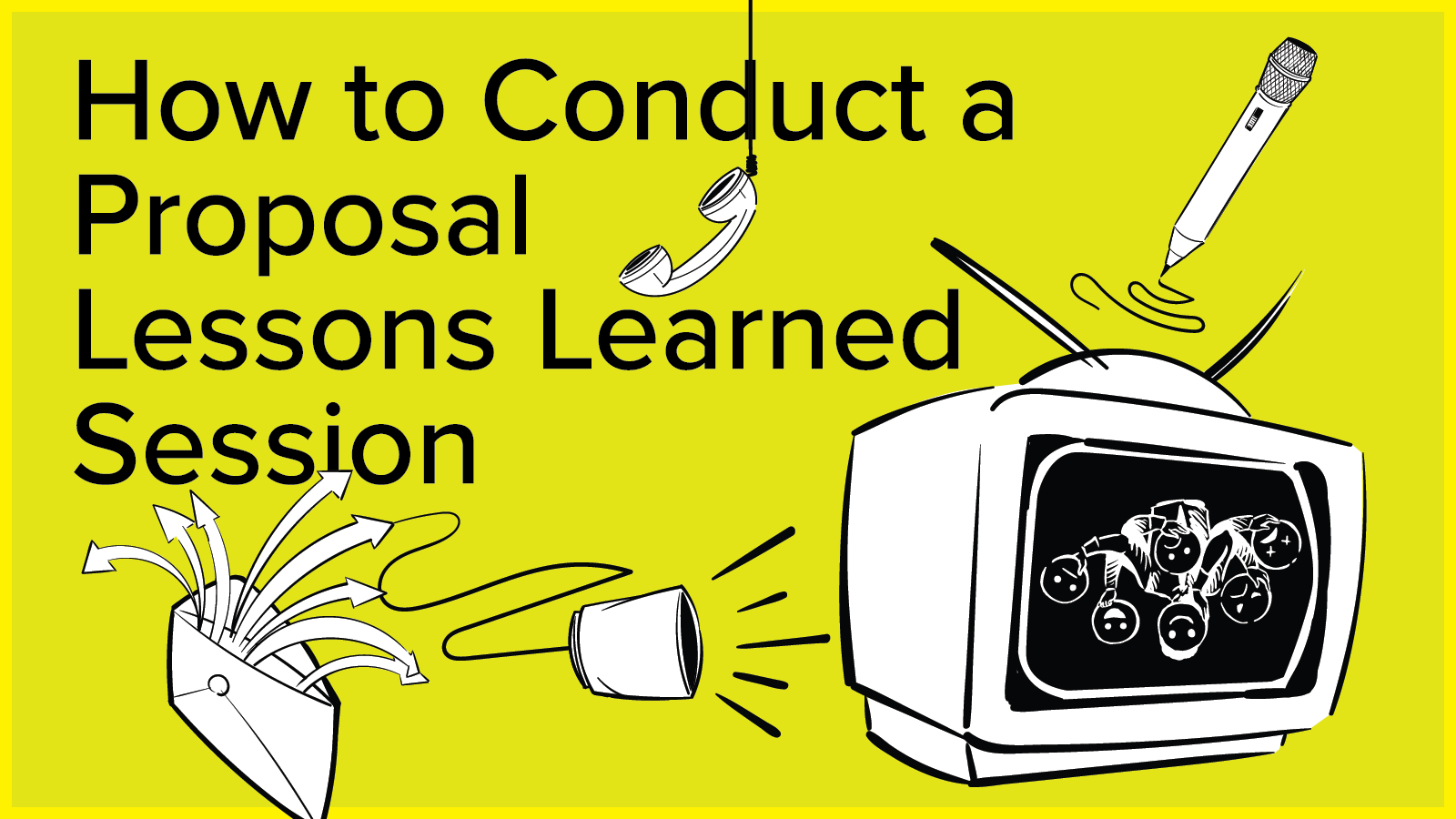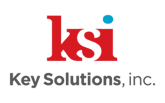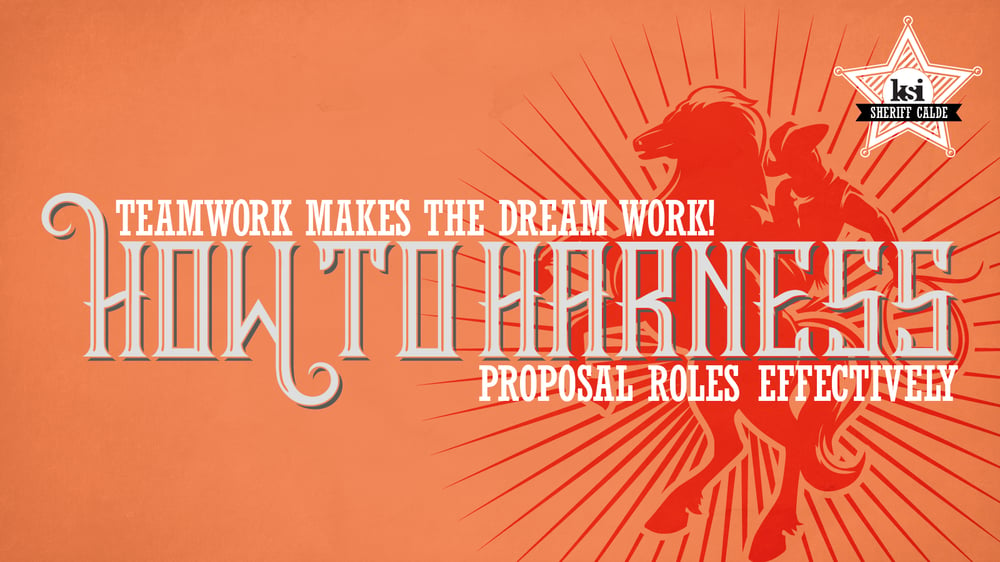
How important are the roles on a proposal development team – from the Proposal Manager to the Graphic Designer?
Working as a team is all about developing relationships, communicating, and respecting each team member’s role to create a winning proposal. In this post, we will cover the key players and their responsibilities within a proposal team and the importance of understanding your role to prevent errors and misunderstandings.
Proposal Team Roles
Behind every successful proposal is a great team. A proposal team is typically made up of the following roles:
Capture Manager: The Capture Manager is responsible for executing capture-related activities for each opportunity. These activities include documenting capture intelligence and creating a Capture Plan, providing a completed version of the Capture Plan to the proposal team, identifying and working with subcontractors and teaming partners, developing a teaming strategy, managing the proposal pursuit budget, and supporting the proposal team during the development of the section strategy templates, storyboarding, Color Team Reviews, and more.
Proposal Manager: The Proposal Manager is involved from the very beginning. Even before the final RFP drops, the Proposal Manager works with the Capture Manager to prepare the win strategy, messaging and win themes, and appropriate data calls for the proposal. Once the final RFP is released, the Proposal Manager develops the Kickoff Meeting slide deck, coordinates the meeting, creates the proposal schedule, builds the compliance matrix, and lays out the proposal outline for the writing team. The Proposal Manager oversees the progress of each writer’s section and also provides all the information needed for the Desktop Publisher to create the writing template/deliverables and for the Graphic Designer to develop visuals for the proposal.
Proposal Writer: The Proposal Writer is responsible for developing proposal content that addresses the RFP requirements. The size of the writing team is dependent on the size of the proposal, as well as the workload/bandwidth of the assigned writers. The writers focus on their assigned section(s), such as the technical approach, past performance, or even the pricing narrative, to develop content for each Color Review deadline and work to enhance their content during the recovery cycles. Depending on how the proposal team responsibilities are assigned, some writers also focus on editing tasks for their section(s) and/or the entire proposal.
Editor: The Editor is responsible for further refining proposal content. The Editor focuses on grammar, readability, clarity, and consistent use of conventions throughout the proposal. When there is enough time allotted in the proposal schedule, the Editor reviews the proposal before each Color Review to ensure content is easy to read and that the Reviewers aren’t bogged down by typos or awkward sentences.
Desktop Publisher: The Desktop Publisher is responsible for reviewing the RFP for formatting requirements to ensure a compliant proposal and avoid disqualification over details such as margins, font style and size, table font style and size, headers and footers, page numbering, spacing, and more. Focusing on the RFP requirements, the Desktop Publisher creates a writing template with the appropriate formatting requirements as a clean version of the document for writers to begin working from. The Desktop Publisher ensures the document is properly formatted according to requirements before each Color Team Review and performs a final DTP pass of the document to ensure it is entirely compliant before submission.
Graphic Designer: The Graphic Designer focuses on the requirements related to all visuals, including the cover page, tabs, and graphics for the proposal. The Graphic Designer creates a graphics template that aligns with the RFP requirements, including graphics font style and size, and ensures correct sizing of the graphics when inserted into the proposal document. The Graphic Designer also helps maintain the graphics library for the proposal to ensure all graphics drafts, updates, and edits are completed and that the writer or desktop publisher is notified when the graphics are ready to be inserted into the proposal.
Depending on the structure and capabilities of the team, it is common to see the Desktop Publisher and Graphic Designer roles filled by the same person. This is possible when that individual has multiple skill sets to be able to support both roles and “wear multiple hats.” That being said, it can become difficult if the Desktop Publisher/Graphic Designer has too much on their plate or if a particular proposal effort is very large. In either scenario, it is considered a best practice to have one dedicated person to support DTP and one dedicated person to support graphic design.
Proposal Kickoff!
Once the Proposal Manager and team have completed the initial deliverables (schedule, compliance matrix, Kickoff Meeting slides, templates, and annotated outlines), it’s time to kick things off! The following is a sample agenda for a Kickoff Meeting.
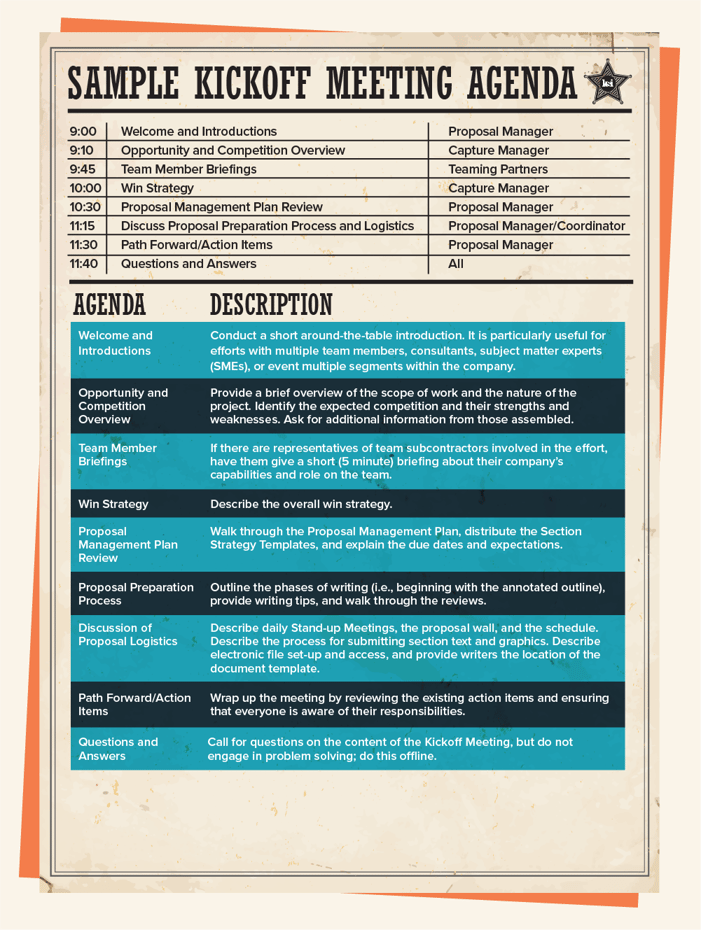
The sample Kickoff Agenda is from the KSI Advantage™ Capture & Proposal Guide.
The Kickoff Meeting is an incredibly important step in the proposal process. It is typically facilitated by the Proposal Manager and Capture Manager, as well as any other heavily contributing business development/sales team members or appropriate company decision-makers/stakeholders. The Kickoff Meeting is a way for everyone involved in the proposal to start on the same foot. During the Kickoff Meeting, the Capture Manager details the background information of the opportunity, as well as important insight into the customer and bidding landscape. The Proposal Manager shares the proposal logistics, such as communicating the schedule, process, roles, assignments, and other important proposal details.
Communicating for success!
As discussed above, the Kickoff Meeting helps everyone on the team get a clean start and lays out a clear path forward. This is an important communication milestone in the proposal development process. Clear and consistent communication are major parts of successful proposal execution. The Kickoff Meeting creates a circle of communication within the team, enabling everyone to “row in the same direction” and work towards the same end goal because expectations are clearly relayed to the team, helping everyone remain accountable.
Another opportunity to maintain healthy communication on the team is to schedule regular status calls. These calls generally occur on a weekly basis and help the team come together to share the status of everyone’s assignments, any existing gaps or issues encountered, and any changes or developments that have occurred. The number of weekly status calls depends on the proposal submission timeframe. It is considered a best practice to have:
- Two to three calls per week for a 3-week or longer response timeframe
- Five calls per week (daily) for a 2-week or shorter response timeframe
It’s important to respect the channels of communication that the Proposal Manager has put in place. If there are conflicts with the set meeting times, be sure to communicate directly with the Proposal Manager as soon as the conflict occurs. This will help keep the Proposal Manager informed and reduce the potential for tasks falling behind.
Beyond status calls, chat portals (Microsoft Teams, Slack, Google Chat, etc.) and emails are important channels to use when practicing good communication. Creating a group chat that includes the entire team is also helpful. This allows team members to pose questions and/or updates to the team about pressing items.
Understanding the importance of assigned roles!
The Proposal Manager makes the assignments for each team member with a purpose and based on the team members’ bandwidth and skillset. Depending on the company, some teams may have people solely dedicated to the proposal, and others may have individuals performing on a contract while also working on the proposal. It is important to stick to the assigned tasks and not let the day-to-day operations distract from established deadlines.
Of course, this is always easier said than done, but if distractions do creep into the proposal development lane it is important to address them in advance with the Proposal Manager so things don’t fall behind. The earlier things are communicated, the easier it is to find a solution, such as reassigning tasks or bringing in an extra set of hands to help.
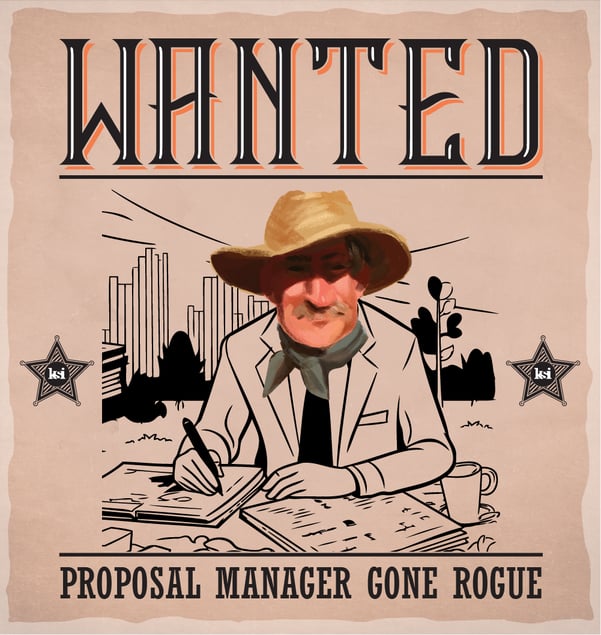
It is also important to be respectful of the roles and assignments. Just because someone may have some background knowledge or expertise in a particular area does not mean that person should take over another team member’s section or tasks without discussing it with the Proposal Manager and team member first. “Going rogue” can create a different set of issues and cause confusion.
For example, let's say that you are a Proposal Manager or a Proposal Writer who possesses some knowledge of desktop publishing or graphic design. Although you may feel confident in performing such a task, it is highly recommended to allow the specialist assigned to handle the work. They are experts who are trained and experienced and will likely complete the work more efficiently and effectively than someone without their level of expertise.
Sometimes, doing someone else's task because it may seem faster for you to do it, rather than leveraging the team member with the right expertise and assignment, can open the door to creating mistakes and may actually create more work. This disconnect can distract from the main goal of the assignment and cause confusion, especially when approaching deadlines. Lack of communication impacts the proposal and can show in the final product.
Conclusion
In summary, each person is assigned their role and/or section(s) for a reason. It is important to respect those assignments to help maintain the level of teamwork and harmony necessary to develop a winning proposal. Remember these important points when working on a proposal team:
- Respect the schedule and immediately communicate with the Proposal Manager if you start to fall behind.
- Ask questions if you are uncertain about anything – getting answers helps you move forward on the right path with the rest of the team.
- Respect the roles and assignments as they have been set.
When people work together, it reduces stress levels across the team and helps the proposal development process go smoothly. When working in harmony and communicating among the team, you increase the overall quality of the final product and your chances of submitting a winning bid!


